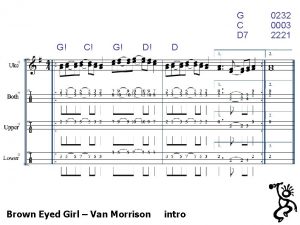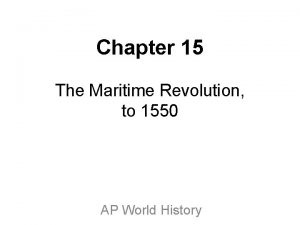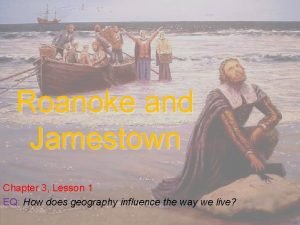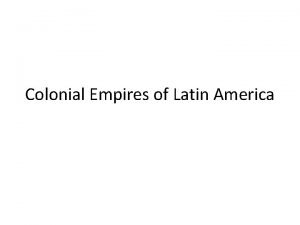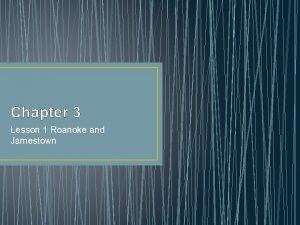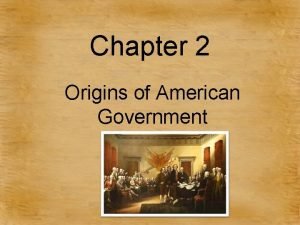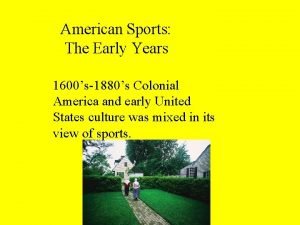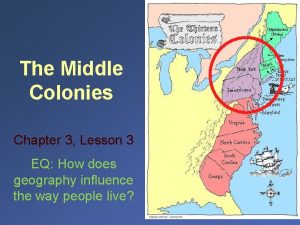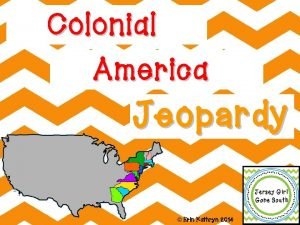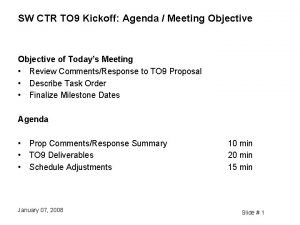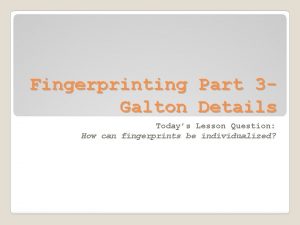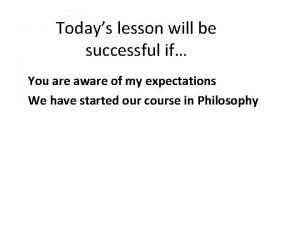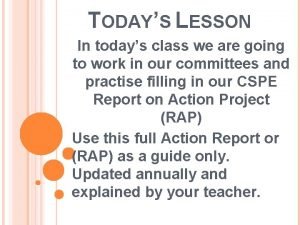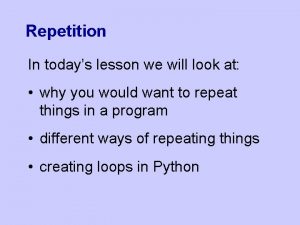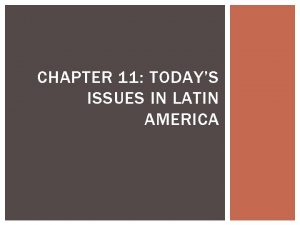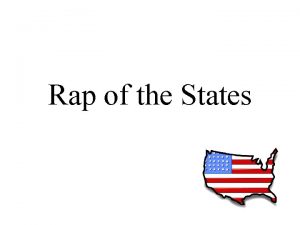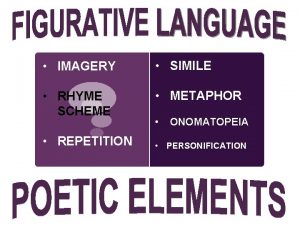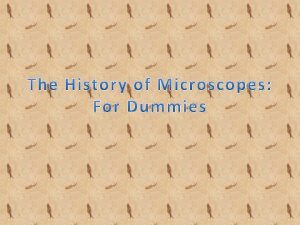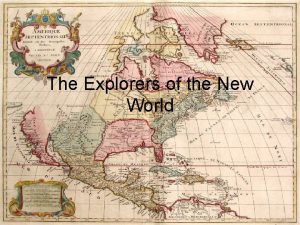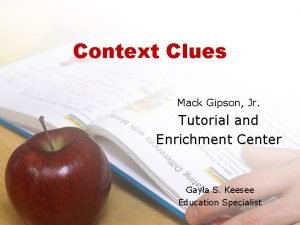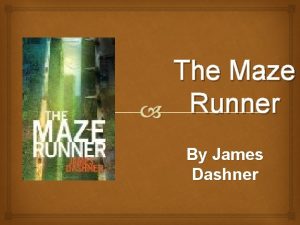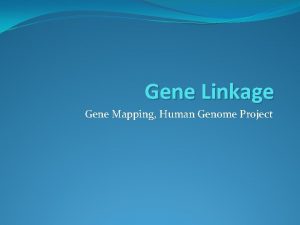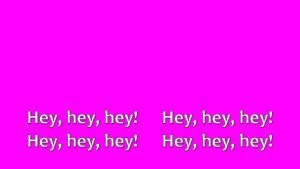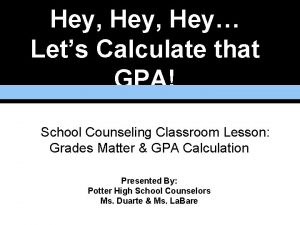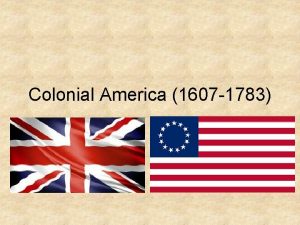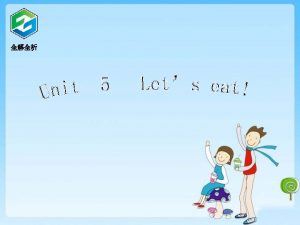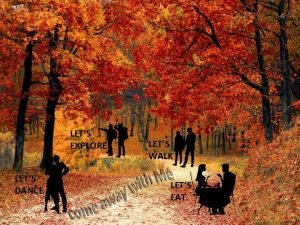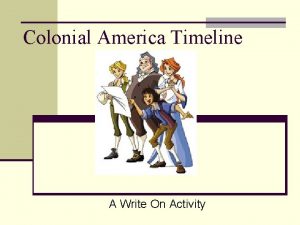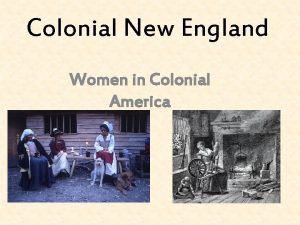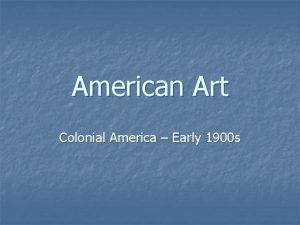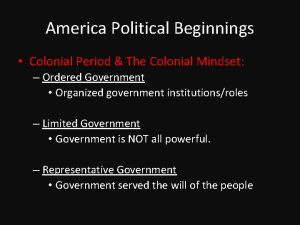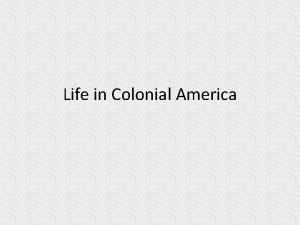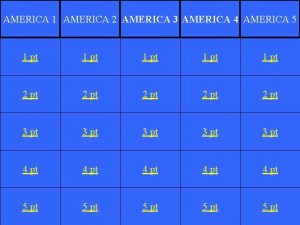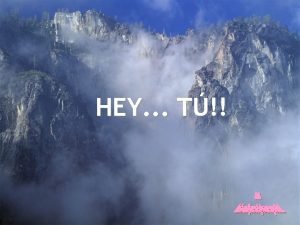Hey US A Lets discover COLONIAL AMERICA today











































- Slides: 43

Hey! US A Let’s discover… COLONIAL AMERICA today!

Vocabulary colony: a distant territory belonging to or under the control of a nation.

Vocabulary colonist: a person who lives in a colony.

Vocabulary wigwam: a hut used by the American Indians usually having an arched frame of poles covered with bark, rush mats, or hides.

Vocabulary apprentice : a person who is learning a trade from a skilled employer, having agreed to work for a fixed period at low wages.

European nations came to the Americas to increase their wealth and broaden their influence over world affairs.

The Spanish were among the first Europeans to settle in the New World. French, Dutch and Russian settlers also had early colonial outposts on the American continent.

By 1650, however, England had established a dominant presence on the Atlantic coast. The first colony was founded at Jamestown, Virginia, in 1607.

Colonial settlers came to America for many reasons. Some came for religious freedom. Some came to make money. The Colonists settled into 13 colonies…

1607 – 1776 The Colonial Period Virginia (1607) New Jersey (1618) Massachusetts (1620) New Hampshire (1622) Pennsylvania (1623) New York (1624) Maryland (1634) Connecticut (1635) Rhode Island (1636) Delaware (1638) North Carolina (1653)

1607 – 1776 The Colonial Period Eventually, these 13 English colonies came together to form the United States.

1607 – 1776 The Colonial Period Eventually, these 13 English colonies came together to form the United States.

In the early days of the colonial period, the settlers did not know how to live in the wilderness, and they faced many hardships.

In Massachusetts, for example, the Plymouth settlers, spent most of their first winter (1620 -1621) on board their ship.

The following winter, the settlers lived on land but in wigwams and sailcloth tents. Many were sick and all were hungry. Nearly 1/4 of them died before a ship from England brought fresh supplies.

In time, the colonists learned how to live in the wilderness - through trial and error and the help of some of the more friendly Native American tribes.

By the 1700 s, small cities and towns were well established. The colonists slowly developed their own customs and lifestyles. Eventually they began to feel that this new land was now their true home.

Life in colonial America centered around the family. Most people worked, played, learned, and worshiped at home. A large family was necessary in colonial days to get all the work done.

The father was considered the head of the household. He made all of the decisions concerning their families and earned money through farming and jobs outside the home.

Women worked in the home, raising the children, preparing the meals, sewing clothes, preserving food for the winter, scrubbing laundry, fetching water, and stoking fires.

Remember, the Colonial Period lasted over 150 years in 13 different colonies! A child's life in Colonial America would differ greatly, depending on the time and place in which the child lived.

Colonial children learned about the adult world by doing things the way their parents did. Children were expected to help with the family's work.

Colonial children learned about the adult world by doing things the way their parents did. Children were expected to help with the family's work. Boys helped their fathers and girls did chores at home. By the time a girl was four she could knit stockings!

Even with all the work they did, colonial children still found time to have fun. They cared for their pets, played with dolls, shot marbles, pitched pennies, and went fishing.

Children also played tag, stickball, and blind man's bluff.

In Colonial Days, most children were considered adults when they were 14 years old!

Although there were a few opportunities for teenage girls to receive a formal education, most families kept their daughters at home to learn how to run a household. They looked forward to special social events such as parties, weddings, and

Teen boys began an apprenticeship in the area their family wanted them to pursue. Some went to college if their families could afford it. Young men also spent time working on the family farm.

By 1770, more than 2 million people lived and worked in England’s 13 North American colonies.

SIDE NOTE… Although the British controlled the 13 colonies on the east coast, the French took control of Canada, which is why it is not part of America today. The British tried to fight for that land, but were defeated and the French held control.

SIDE NOTE… The Spanish claimed Mexico and some of the western parts of North America including the southern coast of California, Florida and part of the Caribbean.

SIDE NOTE… Notice how France claimed most of the land west of the Colonies back in the 1700 s? Is that land part of America today? If so, what do you think happened?

Where could you find more information about the 13 Colonies?

It’s as easy as PIE! AUTHOR’ S PURPOSE Why did the author write this https: //www. youtube. com/watch? t=52&v=ECE 0 I 0 Ae. XXE piece?

Author’s Purpose Why did the author write this text? A) To PERSUADE When authors write to persuade, the goal is to persuade or convince the audience to believe in something.

Author’s Purpose Why did the author write this text? A) To PERSUADE B) To INFORM When authors write to inform, the goal is to give the audience information they don’t already have. In this case, the author’s job is to report facts, not give his or her thoughts on the subject.

Author’s Purpose Why did the author write this text? A) To PERSUADE B) To INFORM C) To ENTERTAIN When authors write to entertain they want us to enjoy the writing. Sometimes they make us laugh with a funny story, make us cry with a sad story or poem, or scream because of a scary experience of one of the characters. With this purpose, authors just want us to have fun reading.

Author’s Purpose Why did the author write this text? A) To PERSUADE B) To INFORM C) To ENTERTAIN

Author’s Purpose Why did the author write this text? A) To PERSUADE B) To INFORM C) To ENTERTAIN

In your breakout room, compare life in the Colonial days to life in America today. 5 minutes

1700 2015

SLASH ASSIGNMENT: In Colonial times, why was it important to have a large family? Use evidence from the lesson to support your answer.

THANKS! Please complete this week’s assignment before Friday.
 Song with hey hey hey in chorus
Song with hey hey hey in chorus Please sit down and your seat belts
Please sit down and your seat belts Andreas carlsson bye bye bye
Andreas carlsson bye bye bye Laughing and a running hey hey
Laughing and a running hey hey Hey hey you you get off of my cloud
Hey hey you you get off of my cloud Hey hey you you get off of my cloud
Hey hey you you get off of my cloud When did christopher columbus discover america
When did christopher columbus discover america When did christopher columbus discover america
When did christopher columbus discover america Guided reading lesson 1 roanoke and jamestown
Guided reading lesson 1 roanoke and jamestown Colonial empires in latin america
Colonial empires in latin america Colonial entertainment
Colonial entertainment Colonial america lesson 1 roanoke and jamestown answer key
Colonial america lesson 1 roanoke and jamestown answer key Chapter 2 lesson 1 government in colonial america answers
Chapter 2 lesson 1 government in colonial america answers Colonial america sports
Colonial america sports Guided reading lesson 3 the middle colonies answer key
Guided reading lesson 3 the middle colonies answer key Colonial america jeopardy
Colonial america jeopardy Colonial america jeopardy
Colonial america jeopardy Proposal kickoff meeting agenda
Proposal kickoff meeting agenda Characteristic of fingerprint
Characteristic of fingerprint For today's meeting
For today's meeting Today's lesson or today lesson
Today's lesson or today lesson In today's class
In today's class Example of repitition
Example of repitition Chapter 11 today's issues in latin america
Chapter 11 today's issues in latin america Why called latin america
Why called latin america We can do a rap of the map of the us
We can do a rap of the map of the us Eu amo a américa e a américa me ama
Eu amo a américa e a américa me ama America 2 europe
America 2 europe Repetition in let america be america again
Repetition in let america be america again Discover define develop deliver
Discover define develop deliver When did leucippus discover the atomic theory
When did leucippus discover the atomic theory How many river basins are in nc
How many river basins are in nc Gem discoverer
Gem discoverer 1665 robert hooke
1665 robert hooke Tui smile
Tui smile British colonies today
British colonies today Discover your shape for ministry
Discover your shape for ministry Bill george discover your true north
Bill george discover your true north Cabatto
Cabatto Mack gipson
Mack gipson The maze runner vocabulary by chapter
The maze runner vocabulary by chapter Medical researchers discover that eating lucky charms
Medical researchers discover that eating lucky charms Gene linkage
Gene linkage Discover magazine
Discover magazine



